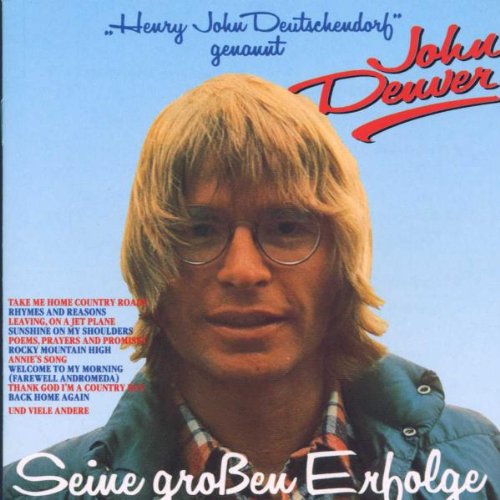John Denver's Unexpected Name Change: The Story Behind The Singer's Name
Was it a stroke of serendipity or a carefully crafted reinvention that launched the career of one of the most beloved musicians of the 20th century? The story of John Denvers ascent to stardom is a compelling narrative of artistic transformation and the power of a well-chosen name, forever changing the landscape of folk and country music.
The genesis of the name "John Denver" is a tale of happenstance and practicality. During a performance at Randys Club Ledbetter, the owner, Randy, observed that Johns given name, Henry John Deutschendorf Jr., would prove unwieldy on a marquee. Randy, having written and recorded a song called "Denver" (and the sheet music being readily available), suggested that John adopt the surname. This simple suggestion, seemingly inconsequential at the time, would become a cornerstone of a legendary career. The irony, of course, is that John Denver was neither from Colorado, nor was he born with that name.
| Category | Details |
|---|---|
| Birth Name | Henry John Deutschendorf Jr. |
| Born | December 31, 1943, Roswell, New Mexico, USA |
| Parents | Henry John Deutschendorf Sr. (US Air Force Lieutenant Colonel) and Erma Louise Swope |
| Early Life | Nomadic childhood due to father's military career, lived in Arizona, Oklahoma, Alabama, Japan, and Texas. Attended junior high school in Tucson, Arizona. |
| Education | Overseas school alumnus |
| Stage Name Adoption | Adopted "John Denver" as his stage name, suggested by Randy. |
| Musical Career Start | Began in folk music groups in the late 1960s. Started solo career in Minnesota. |
| Musical Style | Folk, Country, Acoustic |
| Significant Albums | "Take Me to Tomorrow" (1966), "Poems, Prayers & Promises" (1971), "Rocky Mountain High" (1972), "Back Home Again" (1974), "Windsong" (1975) and many more. |
| Awards and Honors | Numerous awards and honors over four decades. NASA Exceptional Public Service Medal (1985), Freedoms Foundation Award (1980), Grammy Awards, and Country Music Awards. |
| Humanitarian Efforts | Committed to humanitarian work, especially in environmental conservation. |
| Personal Life | Married to Annie Martell, later divorced. Second marriage to Cassandra Delaney. Biological child: Jesse Belle Deutschendorf. |
| Death | October 12, 1997, in a plane crash near Pacific Grove, California. |
| Legacy | Timeless hits, influential voice in music, enduring popularity, and commitment to humanitarian efforts. His songs continue to resonate with audiences worldwide. |
| Reference | Biography.com - John Denver |
Born Henry John Deutschendorf Jr. in Roswell, New Mexico, on December 31, 1943, John Denver's early life was a series of relocations, a consequence of his father's career as a U.S. Air Force officer. This transient upbringing, marked by moves across the United States and even overseas, shaped his early experiences and perhaps instilled a longing for the sense of place that would later become central to his music. His childhood was an itinerant one, spent in locations such as Arizona, Oklahoma, Alabama, and Japan. These frequent moves made forging lasting friendships challenging, a stark contrast to the warmth and connection that would later define his musical persona. Despite this initial rootlessness, the experiences provided a rich tapestry of perspectives and a unique foundation for his future artistic endeavors.
- Find Somali Wasmo On Telegram Channels Groups To Explore
- 2025 Telugu Movies Reviews January 14 Sankranthiki Vasthunnam Review
Denver's musical journey began at the age of eleven, a testament to an early passion. He began playing guitar, and it wasn't long before he began to write his own songs. He started his career in folk music groups in the late 1960s, finding his voice within the burgeoning folk scene. His music, filled with the simple joy of life, the natural world, and the beauty of human relationships, quickly resonated with audiences. He wrote about what he knew, or more accurately, what he aspired toa world of peace, connection, and natural beauty. His ability to paint vivid pictures with words, combined with his warm, inviting voice, became his signature.
The adoption of the stage name "John Denver" was a pivotal moment, a strategic rebranding that presented a clean slate. It allowed him to shed the weight of his given name and embrace an identity that was both memorable and evocative. It was a calculated move, albeit one born of happenstance, that proved immensely successful. It was also a necessary evolution, as Henry John Deutschendorf Jr. would not have fit easily on a theater marquee, nor would it have the same effect on radio airplay. Randy's suggestion was born from the necessity of the entertainment business.
Denver's career unfolded over four decades, a testament to the enduring power of his music. His songs transcended fleeting musical trends, consistently reaching the hearts of listeners. His career was marked by numerous awards and accolades. His commitment to humanitarian causes extended beyond the music, as he advocated for environmental conservation and other important social issues. Denver's impact on music is considerable; he was one of the most popular acoustic artists of the 1970s and a best-selling artist of that era. His influence continues, as his music remains popular across the English-speaking world and beyond. He was a frequent host of the Grammy Awards, and his interests and contributions went beyond the realm of music. His work gained wider recognition, earning him the NASA Exceptional Public Service Medal in 1985, and five years earlier, the Freedoms Foundation Award.
- Hd Hub 4 U Your Guide To Free Movies Shows More
- Tamilblasters New Links Proxies How To Access In 2024
Beyond his musical achievements, John Denver's life was marked by personal relationships and a deep appreciation for family. Several years after they were adopted, John welcomed his first and only biological child, Jesse Belle Deutschendorf, with his second wife, Cassandra Delaney. Denver's children from his first marriage, Zak and Anna, also maintained a close relationship with their father even after his divorce from their mother, Annie. The blending of families and the nurturing of relationships were values that were as important to him as his musical achievements.
The geographic origin of John Denver's music is also somewhat ironic. Though he was not from Colorado, his songs evoked the landscapes and spirit of the Rocky Mountain State, especially in his iconic song "Rocky Mountain High." Despite his itinerant childhood, he established a powerful connection to Colorado, which became synonymous with his identity. His songs often drew on the beauty of the natural world, creating a strong sense of place. He captured a certain sense of nostalgia and a deep appreciation for the beauty of the outdoors, which helped in shaping his image as an artist.
In the end, the story of John Denver is more than just a musical biography; it is an encapsulation of reinvention, perseverance, and the ability of art to evoke deep emotions. From the chance encounter with Randy to the worldwide recognition, his journey continues to be an inspiration to aspiring musicians and fans alike. His legacy lives on in his music and in the countless lives he touched.
Article Recommendations
- Hdhub4u Movie Guide Risks Alternatives Safe Streaming
- Hdhub4u Risks Safe Alternatives What You Need To Know



Detail Author:
- Name : Richie Fritsch
- Username : kenyon85
- Email : atreutel@hotmail.com
- Birthdate : 1988-02-20
- Address : 879 Mireille Bridge Gennaroburgh, MN 40644-4298
- Phone : 954.715.0294
- Company : Schulist, Stracke and Herman
- Job : Paving Equipment Operator
- Bio : Cumque placeat magnam quas. Voluptatem tenetur mollitia hic dolorem corporis in. Provident ut cum velit. Rerum porro cupiditate ab et cum voluptate quia.
Socials
instagram:
- url : https://instagram.com/morgan_id
- username : morgan_id
- bio : Blanditiis voluptatum exercitationem quidem illo qui. Quis nihil voluptate qui adipisci earum et.
- followers : 5240
- following : 877
linkedin:
- url : https://linkedin.com/in/morganmraz
- username : morganmraz
- bio : Praesentium dolore quia magnam eius sit.
- followers : 6459
- following : 1510
facebook:
- url : https://facebook.com/morgan.mraz
- username : morgan.mraz
- bio : Est minima itaque sit rerum in. Eligendi qui error sed velit maxime numquam.
- followers : 278
- following : 1511
twitter:
- url : https://twitter.com/mrazm
- username : mrazm
- bio : Alias quod reiciendis quaerat recusandae rerum. Et maxime at mollitia dolor. Voluptatum consequatur ipsa et fugiat.
- followers : 2665
- following : 2994
tiktok:
- url : https://tiktok.com/@mraz1975
- username : mraz1975
- bio : In excepturi voluptatem iure sint. Enim voluptatibus sapiente eius ex.
- followers : 189
- following : 39
